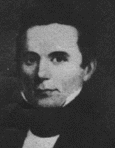|

|
Chapter 3: Nineteenth Century to 1865
Romanticism
Elias Boudinot (Buck Watie, Cherokee)
1802?-1839
|
© Paul P. Reuben
May 28, 2020
E-Mail
|
 Azerbaijanian translation of this page by Amir Abbasov (28May2020)
Azerbaijanian translation of this page by Amir Abbasov (28May2020)
 French Translation of this page by Jean-Etienne Bergemer (14May2020)
French Translation of this page by Jean-Etienne Bergemer (14May2020)
Swedish Translation of this page by Justin Watson (16Mar2020)
Finnish Translation of this page by Elsa Jansson
Page Links| Primary
Works |
Selected
Bibliography |
MLA Style
Citation of this Web Page
|
Site Links: |
Chap
3: Index
|
Alphabetical
List
|
Table
Of Contents
| Home
Page
|

Elias Boudinot was born near
Rome, Georgia, about 1802. Like his cousin John Ridge, he
was sent to Cornwall, Connecticut, to attend school. During the course
of his journey he visited Elias Boudinot, the eminent jurist and
diplomat, who was his patron and benefactor. As a compliment to him,
this young Cherokee adopted his name. Several years after leaving the
Cornwall school, he returned to that village to marry Miss Harriet
Gold, whose acquaintance he had made while he was a student. He was one
of the most progressive men in the Cherokee tribe. He labored with the
missionaries in translating the Bible into the Cherokee language and he
was the editor of the Cherokee Phoenix, which was the first paper
published for any Indian tribe. With Major Ridge and John Ridge, he was
regarded as a leader of the Treaty Party and he met his death by
assassination on the same day that they did. Several of his descendants
have been prominent in the affairs of the Cherokee Nation. Stand Watie,
the Cherokee Confederate leader, was a younger brother of Boudinot.
Source:
EB
- Cherokee Leader in the Indian Territory
Elias Boudinot (Cherokee
Newspaper editor) on Removal and "civilization" efforts,
1828:
It appears that the advocates of
this new system of civilizing the Indians are very strenuous in
maintaining the novel opinion that it is impossible to enlighten the
Indians, surrounded as they are by the white population, and that they
assuredly will become extinct, unless they are removed. It is a fact
which we would not deny, that many tribes have perished away in
consequence of white population, but we are yet to be convinced that
this will always be the case, in spite of every measure taken to
civilize them. We contend that suitable measures to a sufficient extent
have never been employed. And how dare these men make an assertion
without sufficient evidence ? What proof have they that the system
which they are now recommending will succeed? Where have we an example
in the whole history of man, of a Nation or tribe, removing in a body,
from a land of civil and religious means, to a perfect wilderness, in
order to be civilized? We are fearful these men are building castles in
the air, whose fall will crush those poor Indians who may be so blinded
as to make the experiment. We are sorry to see that some of the
advocates of this system speak so disrespectfully, if not
contemptuously, of the present measures of improvement, now in
successful operation among most of the Indians in the US -- the only
measures too, which have been crowned with success and bid fair to
meliorate the condition of the Aborigines.
Source:
EB
on Removal
Primary
Works
Boudinot, Elias. Poor
Sarah:
or religion exemplified in the life and death of an Indian woman.
1818.
Gaul, Theresa S. ed. To Marry an
Indian: The Marriage of Harriet Gold and Elias Boudinot in Letters,
1823-1839. Chapel Hill: U of North Carolina P, 2005.
Cushman, Ellen. The
Cherokee Syllabary: Writing the People's Perseverance. Norman: U
of Oklahoma P, 2011.
Dale, Edward E., and Gaston
Litton. Cherokee cavaliers; forty years of Cherokee history as
told in the correspondence of the Ridge-Watie-Boudinot family.
Norman: U of Oklahoma P, 1939. E99 .C5 D23
Gabriel, Ralph H. Elias
Boudinot, Cherokee, & his America. Norman: U of Oklahoma P,
1941. E99 .C5 B74
Gaul, Theresa S. ed. To
Marry an Indian: The Marriage of Harriet Gold and Elias Boudinot in
Letters, 1823-1839. Chapel Hill: U of North Carolina P, 2005.
Hudson, Angela P. '"Forked
Justice': Elias Boudinot, the US Constitution, and Cherokee Removal."
in Stromberg, Ernest. ed. American Indian Rhetorics of Survivance:
Word Medicine, Word Magic. Pittsburgh: U of Pittsburgh P, 2006.
Perdue, Theda. ed.
Boudinot, Elias. Cherokee Editor: The Writings of Elias
Boudinot. Athens, GA: U of Georgia P, 1996.
Peyer, Bernd C. The
Tutor'd Mind: Indian Missionary-Writers in Antebellum America.
Amherst: U of Massachusetts P, 1997.
MLA Style
Citation of this Web Page:
Reuben, Paul P. "Chapter 3: Elias
Boudinot." PAL: Perspectives in American Literature- A Research
and Reference Guide. WWW URL:
http://www.paulreuben.website/pal/chap3/boudinot.html (provide page
date
or date of your login).
| Top |

